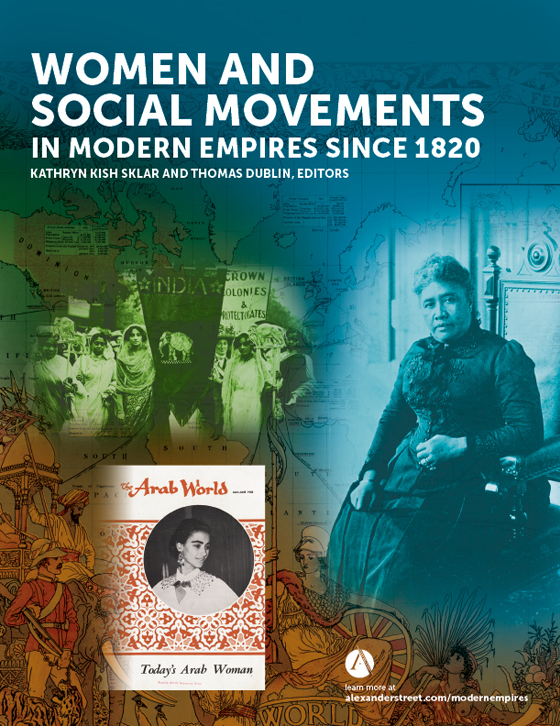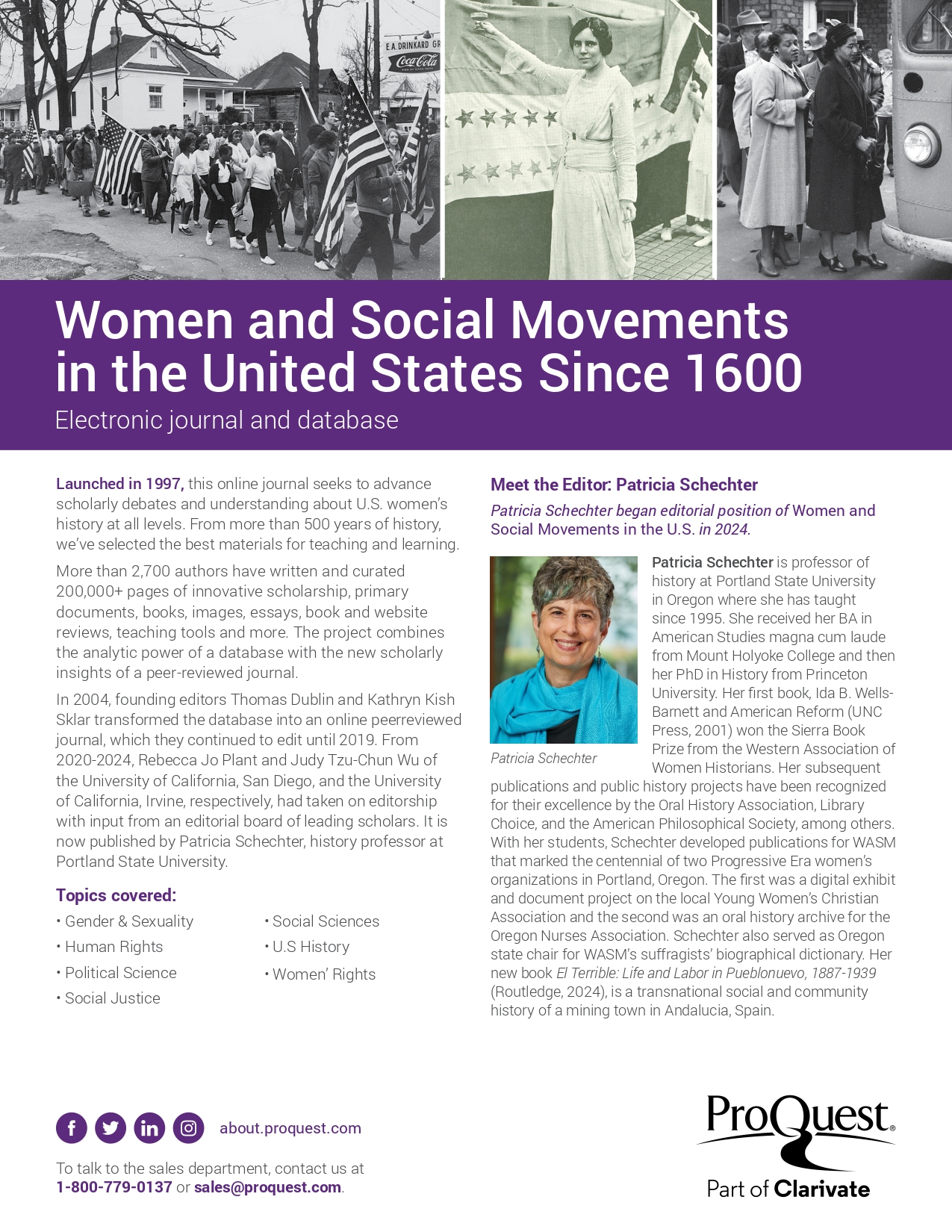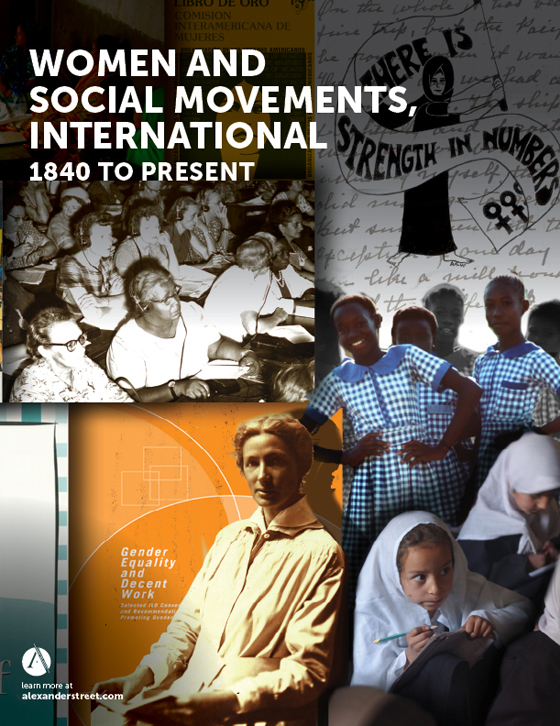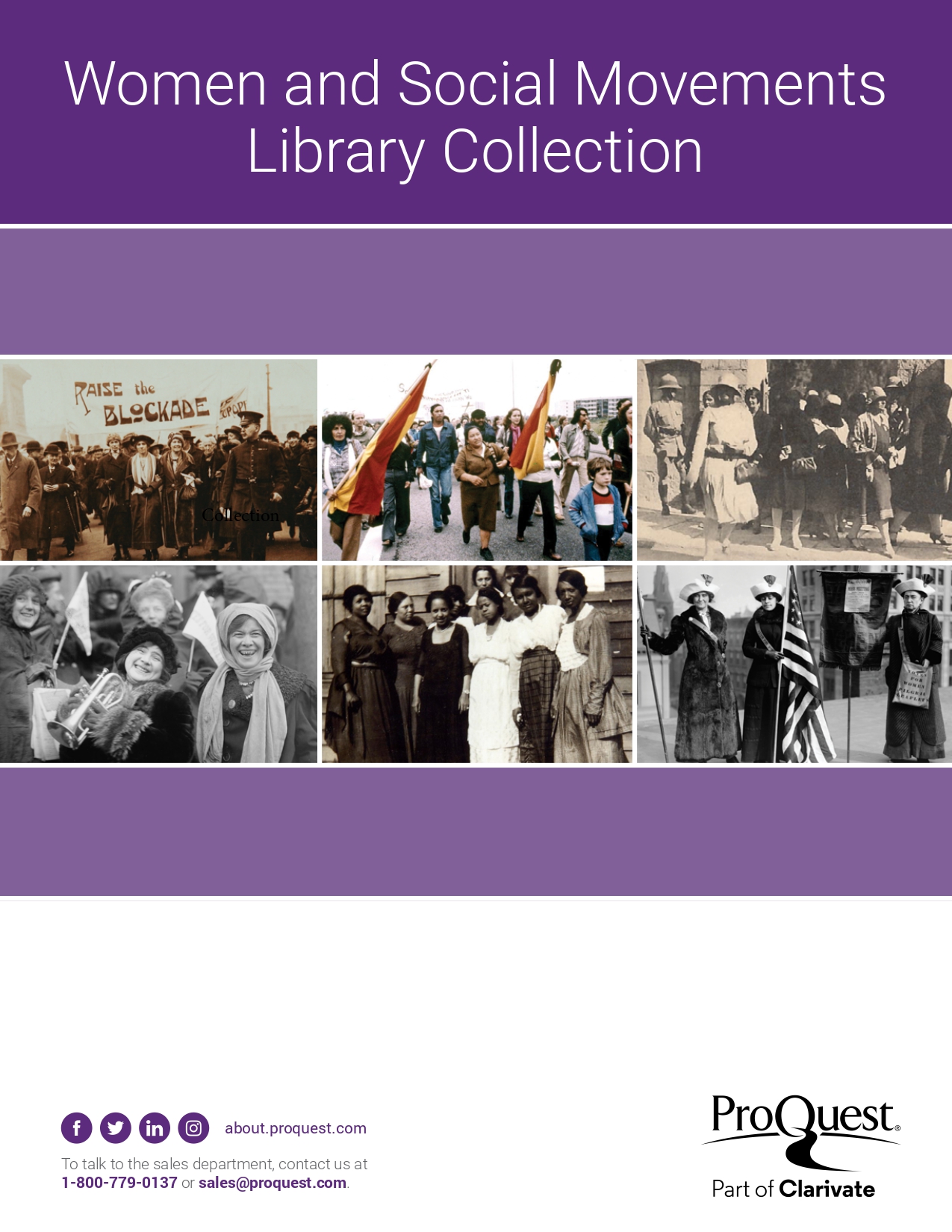 Go inside the woman's suffrage movement with Elisabeth Freeman … view the 1948 United Nations Declaration of Human Rights with Minerva Bernardino … explore the foundation for the modern LGBTQ movement in The Ladder, published by the Daughters of Bilitis … and read the words of Justina, who joined the armed struggle against the American-sponsored regime in Guatemala in the 1980s.
Go inside the woman's suffrage movement with Elisabeth Freeman … view the 1948 United Nations Declaration of Human Rights with Minerva Bernardino … explore the foundation for the modern LGBTQ movement in The Ladder, published by the Daughters of Bilitis … and read the words of Justina, who joined the armed struggle against the American-sponsored regime in Guatemala in the 1980s. The Women and Social Movement Library Collection includes the following:
- Women and Social Movements in the United States Since 1600
- Women and Social Movements, International, 1840–2010
- Women and Social Movements in Modern Empires since 1820
- Women and Social Movements, Development in the Global South, 1919-2019
- Online Biographical Dictionary of the Woman Suffrage Movement in the United States
Women and Social Movements in the United States Since 1600
Learn more about Women and Social Movements in the United States!

Women and Social Movements, International 1840 to Present
Women and Social Movements, International provides an unparalleled survey of how women’s struggles against gender inequalities promoted their engagement with other issues across time and cultures. Backed by a global editorial board of 130 scholars, Women and Social Movements, International is a landmark collection of primary materials drawn from 300 repositories. Assembled and cross-searchable for the first time, these resources illuminate the writings of women activists, their personal letters and diaries, and the proceedings of conferences at which pivotal decisions were made. The collection lets researchers see how activism of the past shaped events and values that live on today, with deep insight into peace, human trafficking, poverty, child labor, literacy, and global inequality. More than 150,000 pages of primary source documents include a central core of 60,000 pages of the proceedings of more than 400 international women’s conferences. Users will find coverage of topics including:
- The 1840 World’s Anti-Slavery Convention in London.
- The “Beijing + 15” agenda, which reviewed implementation of the 1995 Beijing Platform.

- The Casablanca Dream conference of 2007, which united women from the Global South.
- Crucial meetings of the League of Nations, the International Abolitionist Federation, the Inter-American Commission on Women, the African American Institute, the International Council of Jewish Women, and others.
Women and Social Movements in Modern Empires since 1820
As the agents of empire, women acted as missionaries, educators, healthcare professionals, and women’s rights advocates. As opponents of empire, women were part of nationalist, resistance, and reform movements, and served as conservators of culture.
Through more than 70,000 pages of curated documents, plus new video and audio recordings, Women and Social Movements in Modern Empires since 1820 explores prominent themes related to conquest, colonization, settlement, resistance, and post-coloniality, as told through women’s voices. This archival database includes documents related to the Habsburg, Ottoman, British, French, Italian, Dutch, Russian, Japanese, and United States empires, and to settler societies in the United States and South Africa. A large, innovative section focuses on the voices of Native Women in North America.
Women and Social Movements: Development and the Global South, 1919-2019
Women and Social Movements: Development and the Global South, 1919-2019, edited by Jill Jensen, looks at women’s global economic participation and activism over an entire century. This database sets out to reveal and assess a realm of individual efforts, organizational initiatives and socio-cultural projects led by women in the global south. Within this framework, we contextualize gender, opportunity, and struggle. It includes previously undigitized primary sources, curated government documents, and hard-to-find materials. With this collection, support students and faculty across a variety of disciplines—history, political science, women’s studies, economics, human rights and more.
Learn more about Women and Social Movements: Development and the Global South, 1919-2019!
 Just Published Online
Just Published Online
For this project, editor Thomas Dublin sought out biographical sketches of Black Woman Suffragists and supporters of the National Woman’s Party and the National American Woman Suffrage Association. This work is yielding names of more than 3,500 activists not previously identified in biographical dictionaries.

The Empire Suffrage Syllabus
#EmpireSuffrageSyllabus seeks to enrich our historical understanding and pedagogy by placing the U.S. suffrage movement in a much broader context—temporally, thematically, and geographically—than it has traditionally been conceived. Viewing the struggle for the vote as only one piece of women’s quest for greater power, the project charts the expansive scope of women's political activities, focusing in particular on their involvement in a wide range of social movements. Above all, it insists that recognition of the U.S. as an empire and an appreciation of the intertwined development of democracy and imperial power is crucial for understanding how, why, and when some women obtained the vote, while others did not. https://documents.alexanderstreet.com/empire-suffrage-syllabus/home
The Women and Social Movements Library Collection is included as part of ProQuest One Women's Studies.
Related Collections
-
 Women and Social Movements in Modern Empires since 1820
Women and Social Movements in Modern Empires since 1820 -
 Women and Social Movements in the United States Since 1600
Women and Social Movements in the United States Since 1600 -
 Women and Social Movements, International 1840 to Present
Women and Social Movements, International 1840 to Present -
 Women and Social Movements: Development and the Global South, 1919–2019
Women and Social Movements: Development and the Global South, 1919–2019 -
 LGBT Studies in Video Series
LGBT Studies in Video Series -
 LGBT Thought and Culture
LGBT Thought and Culture -
 Disability in the Modern World: History of a Social Movement
Disability in the Modern World: History of a Social Movement




